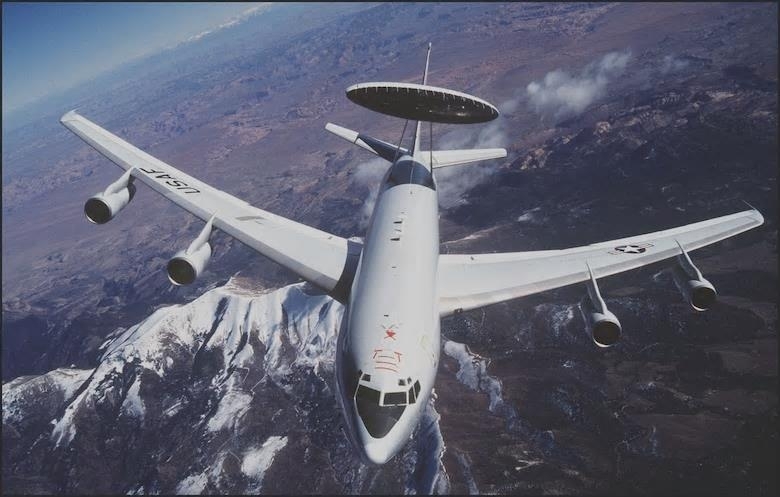US flies early warning aircraft, spy planes over S. Korea: aviation trackers
By YonhapPublished : Dec. 8, 2020 - 11:26

US early warning aircraft and reconnaissance planes have flown over South Korea, aviation trackers showed Tuesday, in an apparent move to monitor North Korea.
One E-3B Sentry airborne early warning and control (AEW&C) jet departed Kadena Air Base in Okinawa and carried out a mission over South Korea and the Yellow Sea on Tuesday, Aircraft Spots tweeted.
This type of aircraft provides all-altitude, all-weather surveillance, command, control and communications, according to the US Air Force.
A South Korean E-737 Peace Eye early warning aircraft, along with two RC-12X Guardrails and one EO-5C Crazy Hawk aircraft operated by US Forces Korea (USFK), also conducted missions over the peninsula in the day, according to another tracker, No callsign.
The E-3B was also spotted over South Korea the previous day, which is not usual, the aviation tracker noted.
On Monday, the US military also flew the E-8C, or JSTARS, over South Korea's southern regions, according to No callsign. It is also known to be capable of closely monitoring the movements of North Korean troops and equipment, including missiles and artillery guns.
The flights came amid speculation that the communist country could undertake provocations, such as missile launches, around the inauguration of US President-elect Joe Biden next month.
"The deployment of those aircraft appears to be part of their regular operations, and the South Korean and the US assets have staged joint missions on a regular basis," an Air Force officer in Seoul said.
South Korean and US military authorities are closely monitoring North Korean military moves while maintaining a firm readiness posture, and there are "no signs that indicate immediate provocative moves by the North," an officer of the Joint Chiefs of Staff (JCS) said. (Yonhap)
One E-3B Sentry airborne early warning and control (AEW&C) jet departed Kadena Air Base in Okinawa and carried out a mission over South Korea and the Yellow Sea on Tuesday, Aircraft Spots tweeted.
This type of aircraft provides all-altitude, all-weather surveillance, command, control and communications, according to the US Air Force.
A South Korean E-737 Peace Eye early warning aircraft, along with two RC-12X Guardrails and one EO-5C Crazy Hawk aircraft operated by US Forces Korea (USFK), also conducted missions over the peninsula in the day, according to another tracker, No callsign.
The E-3B was also spotted over South Korea the previous day, which is not usual, the aviation tracker noted.
On Monday, the US military also flew the E-8C, or JSTARS, over South Korea's southern regions, according to No callsign. It is also known to be capable of closely monitoring the movements of North Korean troops and equipment, including missiles and artillery guns.
The flights came amid speculation that the communist country could undertake provocations, such as missile launches, around the inauguration of US President-elect Joe Biden next month.
"The deployment of those aircraft appears to be part of their regular operations, and the South Korean and the US assets have staged joint missions on a regular basis," an Air Force officer in Seoul said.
South Korean and US military authorities are closely monitoring North Korean military moves while maintaining a firm readiness posture, and there are "no signs that indicate immediate provocative moves by the North," an officer of the Joint Chiefs of Staff (JCS) said. (Yonhap)





![[Herald Interview] 'Amid aging population, Korea to invite more young professionals from overseas'](http://res.heraldm.com/phpwas/restmb_idxmake.php?idx=644&simg=/content/image/2024/04/24/20240424050844_0.jpg&u=20240424200058)












![[KH Explains] Korean shipbuilding stocks rally: Real growth or bubble?](http://res.heraldm.com/phpwas/restmb_idxmake.php?idx=652&simg=/content/image/2024/04/25/20240425050656_0.jpg&u=)

